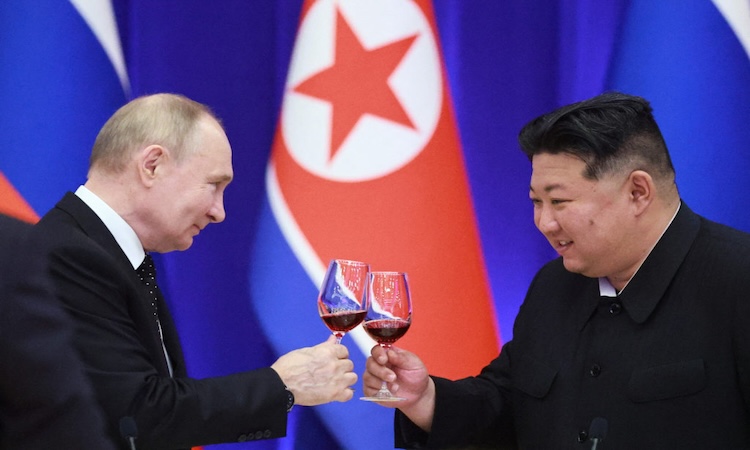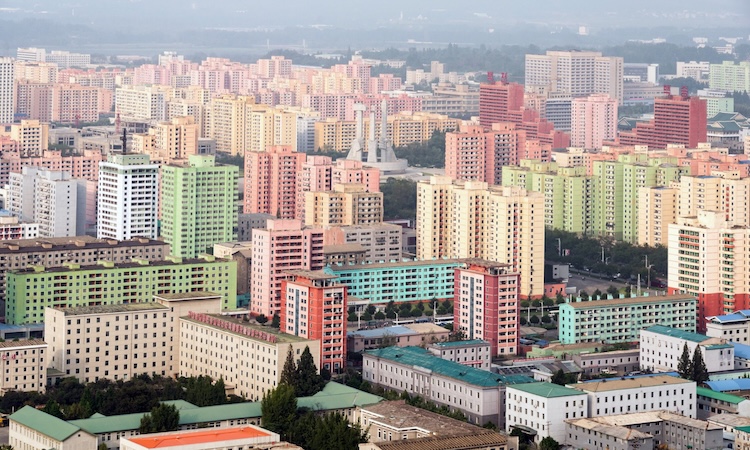The People’s Republic of China (PRC) hit world headlines on 3 January 2019, and earned universal acclaim, when its unmanned Chang’e 4 probe was the first to make a successful landing on the dark side of the moon, touching down in the South Pole-Aitken basin, the largest and oldest crater on the moon, and the largest known impact-formed structure in the solar system.
Chang’e (嫦娥) is the name of the ancient Chinese moon goddess, hence its adoption by the Chinese lunar exploration programme.
This impressive technological achievement, bringing together cutting-edge contributions in the fields of rocket science, telecommunications, mathematics, computing and artificial intelligence (AI), underlines the rapidity of China’s advance towards becoming not only the 21st century’s industrial powerhouse, but its leading technological and scientific centre, capable of challenging US hegemony in every sphere.
A great technological achievement
Interference from the bulk of the moon itself makes direct communication with the surface impossible, which is a major reason that the far side of the moon has remained unexplored until now, some 50 years after the first moon landings.
The following passage from the Guardian underlines the significance of China’s achievement:
“The landing was described as ‘an impressive accomplishment’ by Nasa administrator Jim Bridenstine.
“Martin Wieser, a scientist at the Swedish Institute of Space Physics and principal investigator on one of the instruments onboard Chang’e, said: ‘We know the far side from orbital images and satellites, but we don’t know it from the surface. It’s uncharted territory and that makes it very exciting.’
“A significant challenge faced by the Chinese team was the inability to communicate directly with the spacecraft. Signals to and from the rover are being relayed through a satellite called Queqiao (Magpie Bridge). Queqiao is in a ‘halo orbit’ on the other side of the moon, from where it can communicate with both Chang’e and the Earth.
“During the final phases of the approach, however, Chang’e 4 was on its own and could not be operated remotely. Starting from an altitude of 15km, the craft used a rocket booster to decelerate.
“At 100 metres above the lunar surface, the probe briefly hovered to identify obstacles and measured the slopes on the surface. Using a hi-tech camera and laser measurements to avoid boulders and ditches, it selected a relatively flat area and resumed a slow, vertical descent, touching down softly in the Von Karman Crater within the South Pole-Aitken Basin, according to a report by the Xinhua news agency.
“Chang’e 4 targeted the Von Kármán crater, which was predicted to have a smooth volcanic floor and which sits within the great Aitken basin.
“‘This is a great technological accomplishment as it was out of sight of Earth, so signals are relayed back by their orbiter, and most of the landing was actually done autonomously in difficult terrain,’ said Prof Andrew Coates, a space scientist at UCL’s Mullard Space Science Laboratory. ‘The landing was almost vertical because of the surrounding hills.’” (Far side of the moon: China’s Chang’e 4 probe makes historic touchdown by Hannah Devlin and Kate Lyons, 3 January 2019, our emphasis)
The highlighted passages in the above quotation notes that the autonomous landing demonstrates the extent to which the successful application of AI was necessary to achieve the safe descent of the probe, with both measurements and decision-making being made by pre-programmed logical algorithms.
The probe’s roving explorer module is now conducting preliminary geological surveys, helping us to understand the differing composition of the near and far sides of the moon. There are also on-board experiments to test the feasibility of growing plants on the moon, within its relatively weak gravitational field. Two weeks after landing, in fact, a young cotton seedling had successfully sprouted in the carefully controlled conditions on-board.
“This is the first time humans have done biological growth experiments on the lunar surface,” said Xie Gengxin, who led the design of the experiment.
“Plants have been grown previously on the International Space Station, but this is the first time a seed has sprouted on the moon. The ability to grow plants in space is seen as crucial for long-term space missions and establishing human outposts elsewhere in the solar system, such as Mars.
“Harvesting food in space, ideally using locally extracted water, would mean astronauts could survive for far longer without returning to Earth for supplies.” (Giant leaf for mankind? China germinates first seed on moon by Hannah Devlin, The Guardian, 15 January 2019)
Social significance of the landing
The likelihood of ‘space colonies’ in the near future is overstated and not a realistic prospect that will meaningfully affect our economy and ecology – and certainly not a get-out-of-jail-free card for humanity, which faces real and pressing ecological challenges on Earth, and which capitalism is demonstrating on a daily basis that it has no ability to solve.
But in the ongoing battle for independence and freedom by ‘small’ and non-imperialist countries, in the face of the imperial domination of conglomerate corporate capitalism, the ability of independent states to defend themselves economically and militarily is of the greatest significance for all of us. And, in this regard, China’s mastery of these crucial fields of technology can only be greeted with the greatest enthusiasm.
Socialism v capitalism
There is a further economic argument, of the greatest importance to all who believe that humanity has a brighter future to be built based on cooperation, and an economy and culture aimed at achieving decent and sustainably high living standards for the whole working population of our planet.
It is worth noting that a recent editorial in the Economist magazine, for example, lambasted the “naivety” of a new generation of “millennial socialists”, opining that they have not understood the mechanism to correct the imperfections of capitalism – namely, socialism. With cool reassurance, and flying in the face of all evidence, its author concluded that capitalism remains the only realistic system and that the answer to society’s evident problems is to be found in better application of “budgets, bureaucracies and businesses”. (Millennial socialism, 14 February 2019)
Crude as were the arguments in this piece, they are part of a renewed anti-socialist offensive, as capitalism struggles on through a decade of recession, increasing national isolation and trade war, the disastrous impoverishment of the vast mass of humanity, and seemingly endless imperial adventures of destabilisation, coup attempts and wars of intervention to enable a tiny clique of financiers to cling desperately to the wealth of the planet, cleaving it from its rightful owners.
Can socialism deliver a way out?
The incredible record of rapid industrialisation and technological achievement that are the historical legacy of the first great socialist revolution in Russia, the October Revolution of 1917, should by rights have settled this argument. But the great legacy of emancipation and liberation of humanity, which resulted in the social, cultural, scientific and technological, military and diplomatic powerhouse that was the Soviet Union, are heavily maligned and disputed; thanks largely to the decline and fall of Khrushchevite revisionism, and the ignominious collapse of the once mighty USSR.
Thus there persists a widely prevalent dogma, admittedly fostered and promulgated by the capitalists themselves, that “socialism is incapable of making technological, scientific and cultural advances”. This is essentially a rehash of Francis Fukuyama’s triumphalist ‘End of History’ thesis.
Martin Woolf of the Financial Times underpinned this notion the day before the lunar landing, penning an anti-China rant entitled The future might not belong to China, in which he instructed his readers: “Do not extrapolate from the recent past.
“The view widely held in the 1980s that Japan would be ‘number one’ turned out to be badly mistaken. In 1956, Nikita Khrushchev, then first secretary of the Communist Party of the Soviet Union, told the west that ‘We will bury you!’ He proved utterly wrong. The examples of Japan and the Soviet Union highlight three frequent mistakes: extrapolating from the recent past; assuming that a period of rapid economic growth will be indefinitely sustained; and exaggerating the benefits of centralised direction over those of economic and political competition. In the long run, the former is likely to become rigid and so brittle, while the latter is likely to display flexibility and so self-renewal.”
This is an optimistic (for the capitalists) assessment to say the least. We will leave Khrushchev out of the picture for now, but let the reader note that neither Mao Zedong nor Josef Stalin made such inflammatory statements at the UN, but rather sent their representatives to run rings around imperialism in every sphere, while advancing the cause of the liberation of humanity unceasingly and tirelessly. These two giants of proletarian struggle really did bury tsarist imperialism, German militarist-fascist imperialism, the Chinese empire and Japanese imperialism, and were doing an excellent job of seeing off the remaining capitalist gangsters until Khrushchev appeared on the scene. But the interested reader can read Harpal Brar’s Perestroika, the Complete Collapse of Revisionism to find out more.
The most glaringly false premise expressed by this notoriously reactionary journalist is that the imperialist west is characterised by ‘economic and political competition’. Economically, free-competition capitalism has not existed for over a century!
Lenin long ago outlined the features of monopolist capitalism, which has concentrated industrial and banking capital in its own hands to an ever-increasing degree, controlling markets and spheres of interest, and carving up the entire territory of the world between a handful of economically powerful cliques and nations. (Imperialism, the Highest Stage of Capitalism, 1916)
It was this monopolist position of capitalism that drove the imperialist powers into World War One, and the colossal loss of a staggering 40 million workers’ lives in the internecine war for a redistribution of the world’s colonies and markets. Lenin’s profound insight into the lack of competition and freedom for the world’s masses, languishing under the rule of imperialism, has only been proven increasingly correct by the subsequent development of capitalist imperialism.
Politically, on the other hand, Lenin pointed out in his brilliant work The State and Revolution the Marxist doctrine that “democracy is the very best shell” in in which to conceal the real state of affairs: namely the dictatorship of the bourgeoisie. (1917)
As if to highlight the charade that is bourgeois ‘democracy’ (political competition, if it pleases Mr Wolf), US president Donald Trump and the US establishment took it upon themselves to ‘appoint’ a new president of Venezuela, just a week after the Chinese moon landing, specifically tasked with helping them get their hands on the largest oil reserves on Earth, in the Orinoco basin.
In so doing, they cast aside inconvenient trifles such as the right of sovereign nations to self-determination, as enshrined in the United Nations charter and international law; and the inconvenient fact that their appointee, one Mr Guaido, did not even stand in the last presidential election, let alone win it. Guaido is ‘our man’, and that’s all that matters – that is the democracy, the ‘political competition’, celebrated by these paid hacks of imperialism.
Planning and investment
China’s rise, and its ability, despite huge market encroachment into its economy, to have central direction and planning, and large-scale investment in infrastructure and social projects, underpins the technological advances that make such showcase missions as the Chang’e 4 moon landing possible.
Transforming itself from the sick man of Asia into a great centre of enlightenment, economic might and world civilisation in the space of 70 years would not have been possible were the foundations not laid by its thoroughgoing anti-colonial and anti-feudal national-liberation struggle, and without the leading role of the Communist Party of China (CPC).
The achievement of the USSR in being the first nation to put human beings into space is now downplayed and glossed over in contemporary articles and histories in the west. For our part, we will never forget that on 12 April 1961, aboard the spacecraft Vostok 1, Soviet cosmonaut Yuri Alekseyevich Gagarin became the first human being to travel into space. During the flight, the 27-year-old test pilot and industrial technician also became the first man to orbit the planet, a feat accomplished by his space capsule in 89 minutes.
Moreover, Soviet cosmonaut Valentina Tereshkova became the first woman to fly into space when she launched on the Vostok 6 mission on 16 June 1963.
These were landmarks of achievement for the Soviet economic and social system and for the world’s working class; for women’s equality and for socialism. They also showed that Soviet socialism had the ability to make huge technological investments and achievements.
Should we feel pride in China’s achievement?
Gill Scott-Heron, the well-known New York poet and lyricist, famously wrote of the USA’s moon landing in 1969:
A rat done bit my sister Nell
With whitey on the moon …
I can’t pay no doctor bills
But whitey’s on the moon.
The United States is one of the most racist societies on earth, and the powerful capitalist class has long pushed the ideology of white supremacy on the white working class, which has for many years found its social complement in black nationalism.
But leaving this aside – although this early split of workers along lines of racial ‘identity’ is perhaps the single greatest factor in the impotence of the US working-class movement – there is a broader idea expressed in this poem.
Namely, that the poor and oppressed proletariat of the US, particularly its most oppressed black population, could take no pride in the much-trumpeted technological achievements of the US imperialists while they were deprived of the most basic human necessities of decent and sanitary housing, adequate diet, medical care, etc.
Interestingly, this is a theme of criticism that imperialism has become adept at revising and directing at formerly oppressed and colonised peoples who have gone on to develop marvels of technical achievement – whether these be satellite launches, missile programmes, or the development of nuclear technology. It is a criticism especially thrown at those countries that have had the temerity to join the ‘nuclear club’ without imperialist permission – China, the DPRK, India and Pakistan.
But to accuse developing nations of having ‘inhuman’ priorities while their populations live in poverty on the one hand no longer applies to China, which has lifted a staggering 700 million of its citizens out of poverty over the past 40 years ((almost 1.5 times the population of the EU)), and on the other hand, is deliberately and entirely to miss the point.
In our grotesquely unevenly developed planet, where the needs of the impoverished masses are neglected and trampled underfoot by the callous economic train and war juggernaut of imperialism, it is the political, economic and technological dominance of the finance capitalists that reinforce their domination, and thereby the poverty of the masses. The drive of small nations to break out of imperialism’s technological and industrial stranglehold upon the world economy is of vital interest to the oppressed masses – and it is in this light that such developments must be viewed.
Simple administration is not enough to escape the debt trap in which the huge banks ensnare poorer nations and entire continents; to truly overturn inequality, a social revolution against capitalism is necessary, and the proletariat of each nation must necessarily first reckon with its own bourgeoisie. China has taken this road – hence its success.
It is the European and American proletariats that languish behind in this regard. But British and American workers cannot hope to win power if they don’t even set themselves the task – if their ideological determination and resolve are clouded and subdued; if our faith in the possibility of building a bright future without exploitation of man by man and nation by nation is lost.
“The chief endeavour of the bourgeoisie of all countries and of its reformist hangers-on is to kill in the working class faith in its own strength, faith in the possibility and inevitability of its victory, and thus to perpetuate capitalist slavery. For the bourgeoisie knows that if capitalism has not yet been overthrown and still continues to exist, it owes it not to its own merits, but to the fact that the proletariat has still not enough faith in the possibility of its victory.
“It cannot be said that the efforts of the bourgeoisie in this respect have been altogether unsuccessful. It must be confessed that the bourgeoisie and its agents among the working class have to some extent succeeded in poisoning the minds of the working class with the venom of doubt and scepticism.” (Report on the work of the central committee to the eighteenth congress of the CPSU(B) by JV Stalin, 10 March 1939)
Yes indeed. But the story is not over.
The US seeks to undermine China as an economic competitor, and as a power capable of resisting its plans for global domination. This is the meaning and content of USA’s ‘pivot to Asia’ strategy launched under former president Barack Obama and continued under the regime of President Trump.
In short, the rise of China is creating a multipolar (and therefore safer) world in which other states’ latitude to develop independently is greater, and the possibilities for revolutionary action are increased.
We send our warmest greeting to the scientists of the Chinese lunar exploration programme, to the Chinese workers and peasants, and to the leaders of the dictatorship of the proletariat and of the People’s Republic of China.
















